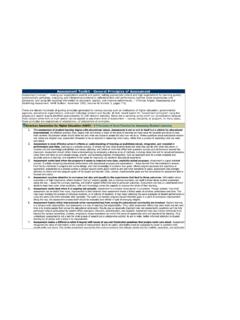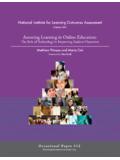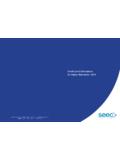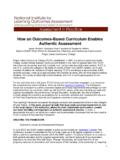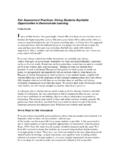Transcription of STUDENT OUTCOMES ASSESSMENT PLAN
1 STUDENT OUTCOMES ASSESSMENT plan Course Assessments And Program Reviews Dr. Jerry Standahl Office of ASSESSMENT and Institutional Research Paul D Camp Community College Franklin, Virginia 23851 November 2008 11/05/03 Revised 11/4/08 1 Table of Contents 2 The Purpose of 2 I. ASSESSMENT for External 6 3 II. ASSESSMENT Productivity .. 8 4 III. ASSESSMENT Of General Education Identified by SACS and VCCS .. 9 Elements of ASSESSMENT and Program Review 13 I.
2 ASSESSMENT of STUDENT 13 8 II. Program Review and STUDENT OUTCOMES ASSESSMENT 23 Appendix_ 26 Appendix_B:_Assessment and Program Review 27 Appendix C: O/T Advisory Committee 28 Appendix D: Classroom ASSESSMENT 29 Appendix E: ASSESSMENT of STUDENT Learning 31 Appendix F: SCHEV Productivity 37 Appendix G: PDCCC Teaching Resources .. 40 Appendix H: Bloom s Taxonomy .. 44 11/05/03 Revised 11/4/08 2 STUDENT OUTCOMES ASSESSMENT plan Introduction Paul D.
3 Camp Community College's five-year STUDENT OUTCOMES ASSESSMENT plan was developed over a period of several years when the Virginia General Assembly mandated that all public institutions of higher education develop ASSESSMENT plans to measure STUDENT achievement. ASSESSMENT in higher education has become increasingly important as the nation debates educational effectiveness at all levels. Political and public pressure requires colleges to be held accountable for both the resources spent in higher education and the educational OUTCOMES of those resources.
4 The primary goal of the College is to help students learn. In order to do this the material taught must be relevant, comprehensive, and current. The order in which the courses are sequenced in programs must be coherent. Course and program goals must be established and designed to prepare students to achieve their educational goals, whether that be employment or transfer. Classroom instruction needs to be supplemented with academic support services and the appropriate resources provided to create environments conducive to learning. The College also needs to validate that we are doing what we say we are doing and that students are learning what we say they are learning.
5 That is why the faculty do annual STUDENT OUTCOMES ASSESSMENT on courses, on the graduates in the academic program they are responsible, and general education (core competencies). Faculty also do a program review of their program every five years according to the five-year cycle. It is a lot of work, but it is something that good educators have always done on a continuing basis. The College wants the best for its students , and a program or discipline review gives the opportunity to examine what we are doing in a thorough and complete fashion.
6 The Purpose of ASSESSMENT OUTCOMES ASSESSMENT is the process of collecting information that will tell an organization whether the services, activities, or experiences it offers are having the desired impact on those who partake in them. In other words, is the organization making a difference in the lives of the individuals it serves? In higher education, at its simplest, OUTCOMES ASSESSMENT has three stages: 1. Defining the most important goals for students to achieve as a result of participating in an academic experience ( OUTCOMES ) 2.
7 Evaluating how well students are actually achieving those goals ( ASSESSMENT ) 3. Using the results to improve the academic experience (closing the loop) Enhancing quality through the improvement of instruction and STUDENT learning, as well as support services is the primary focus of all ASSESSMENT activities at Paul D Camp Community College (PDCCC). The annual outcome ASSESSMENT process is more qualitative and focuses on improving teaching by analyzing STUDENT learning OUTCOMES . The program/discipline review process is more quantitative and focuses on the program/discipline as a whole, how effective it is, and that our students are learning.
8 To achieve the above, some aspect of each program s goals 11/05/03 Revised 11/4/08 3 and objectives needs to be assessed on an annual basis. All program and general education goals must be evaluated at least once within the five-year cycle (It is recommended that most or all STUDENT outcome assessments be completed by the end of the fourth year in the cycle so that the fifth year can focus mainly on the program review). There are the discipline reviews ( developmental studies, dual credit, distance learning, STUDENT services, etc.) which are also reviewed every five years or as needed.
9 (See Appendix B Program Review and STUDENT OUTCOMES ASSESSMENT Schedule) STUDENT Learning OUTCOMES ASSESSMENT In summary, academic STUDENT OUTCOMES ASSESSMENT provides on-going (annual), faculty-based evaluation for the purpose of improving the quality of the college s courses/instructional programs and ensuring that OUTCOMES achieved are consistent with the mission of the college. (See ASSESSMENT , STUDENT OUTCOMES under Elements of ASSESSMENT and Program Review Reports): Is more qualitative and focuses on teaching through the analysis of STUDENT learning OUTCOMES .
10 Improves the quality of the college s instructional programs. Ensures that OUTCOMES achieved are consistent with the mission of the College. Uses the results of the annual assessments and other data to determine the effectiveness of the program during the program review process. Program/Discipline Review Through the review of our programs/disciplines (See Elements of ASSESSMENT and Program Review) we seek to demonstrate that: students are learning the knowledge, skills, and habits of thought necessary to achieve the program/discipline goals and objectives.
